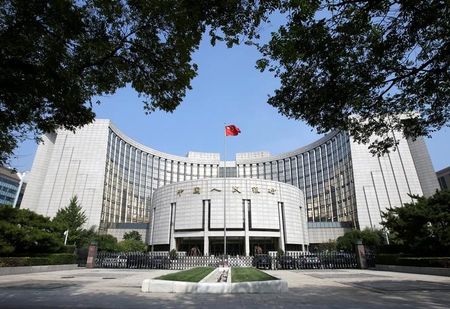BEIJING (Reuters) – A senior Chinese central bank official suggested on Tuesday that the bank’s buying and selling of treasury bonds in the secondary market could be used for liquidity management and as a monetary policy tool.
Investors expect more stimulus to support the world’s second-largest economy, which grew faster than expected in the first quarter but is still facing headwinds.
“The central bank’s trading of treasury bond in the secondary market can be used as a liquidity management method and a reserve of monetary policy tools,” the Financial News – a publication backed by the People’s Bank of China (PBOC)- quoted the unnamed official as saying.
China’s treasury bond market has become the third-largest in the world, and its liquidity has improved, making it possible for the central bank to carry out bond buying and selling on the secondary market, the official was quoted as saying.
China’s long-term treasury bond yields, which have fallen recently, will move “within a reasonable range” in line with expected economic growth, the official said, adding that China’s economic recovery is consolidating.
China’s economy grew faster than expected in the first quarter, but key March indicators on property investment, retail sales and industrial output showed that demand at home remains frail, weighing on overall momentum.
The PBOC has pledged to step up policy support for the economy this year.
“The central bank is optimistic about the prospects for economic growth in the long term. However, factors such as supply and demand will also bring short-term disturbance to long-term treasury bond yields,” the official was quoted as saying.
In the future, treasury bond issuance is expected to quicken, and long-term bond yields will rebound, the official added.
Beijing plans to issue 1 trillion yuan ($138.01 billion) in special ultra-long term treasury bonds to support some key sectors.
The PBOC is not allowed to buy bonds directly from the central government and has rarely engaged in large-scale bond buying in the secondary market.
Any central bank bond operations will be two-way, the publication quoted experts as saying, highlighting differences with developed countries’ bond purchases for quantitative easing purposes.
“The PBOC’s buying and selling treasury bond is quite different from the quantitative easing (QE) operations of these central banks,” it added.
($1 = 7.2456 Chinese yuan renminbi)
(Reporting by Beijing Newsroom and Kevin Yao; Editing by Andrew Cawthorne and Christina Fincher)





